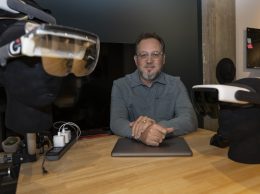MIT Enterprise Forum discusses pros, cons of AI
Regional business leaders explored artificial intelligence and its possible impacts on society and businesses at the latest event held by the MIT Enterprise Forum of the Central Coast
Speakers said that while machines are decades or centuries away from developing consciousness, machines have the power to refine education, car driving and other things that humans are not good at.
Luke Nosek, co-founder of PayPal, said artificial intelligence levels are still nowhere near that of humans. Nosek strongly believes, though, that artificial intelligence can help teachers teach better by allowing programs to teach students while teachers focus more on human things like being able to tell if a student is struggling with problems at home.
“I think humans are over hyped,” Nosek said. “I’m really excited for artificial intelligence. I think we’re going to get it just soon enough to stop doing things humans are bad at.”
Nosek also said machines are being used increasingly by businesses to hire because he said human managers are not good at hiring.
Miles Ward, global head of solutions for Google Cloud and who works out of Google’s Goleta office, said machines are making it easier to detect financial fraud. There are some flaws with artificial systems, though, Ward said, such as the flash crashes Wall Street has experienced in recent years because of deficiencies in machines that use algorithms and data to trade thousands of shares of stock per second.
Much of the math used for artificial intelligence and programs for artificial intelligence have been around for about 30 years, Ward said, but now computers can finally compute these algorithms and sort this data.
“A lot of the impediment in those 30 years was just building software that can solve those problems efficiently,” Ward said.
Luca Foschini, co-founder of Santa Barbara-based Evidation Health, said he thinks artificial intelligence holds real potential for medicine.
In order for artificial systems to be adopted by the masses, though, Ward says average people have to coherently be able to understand what they want to happen and how machines do that. Today it’s really easy to build machines, but it’s hard to instruct them what to do.
While all panelists said there is a need for regulation as these artificial systems evolve, Nosek said regulation comes with its own perils.
“If the economy is destroyed, we need new things to replace it as quickly as possible and regulating things slows that down” Nosek said.
Still, when pressed about concerns that computers may be developing consciousness or self-awareness, Ward says the computing power simply doesn’t exist right now to fathom that discussion.
“We should have this meeting again in the year 2150 when we have the computing power for that,” Ward said “We are super far away.”
• Contact Philip Joens at [email protected].











